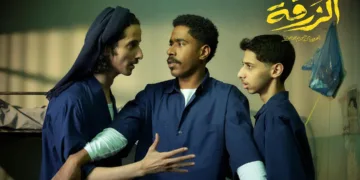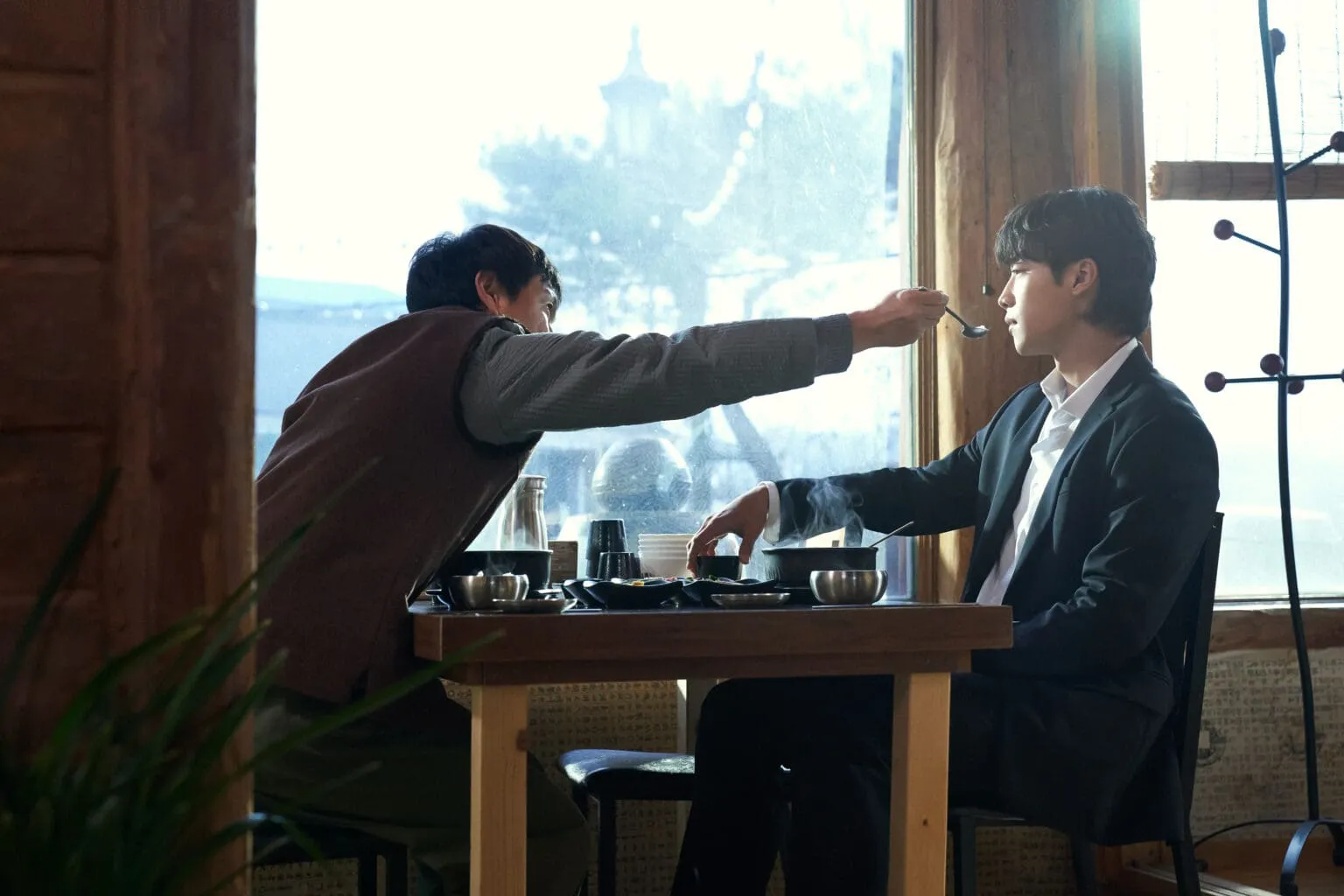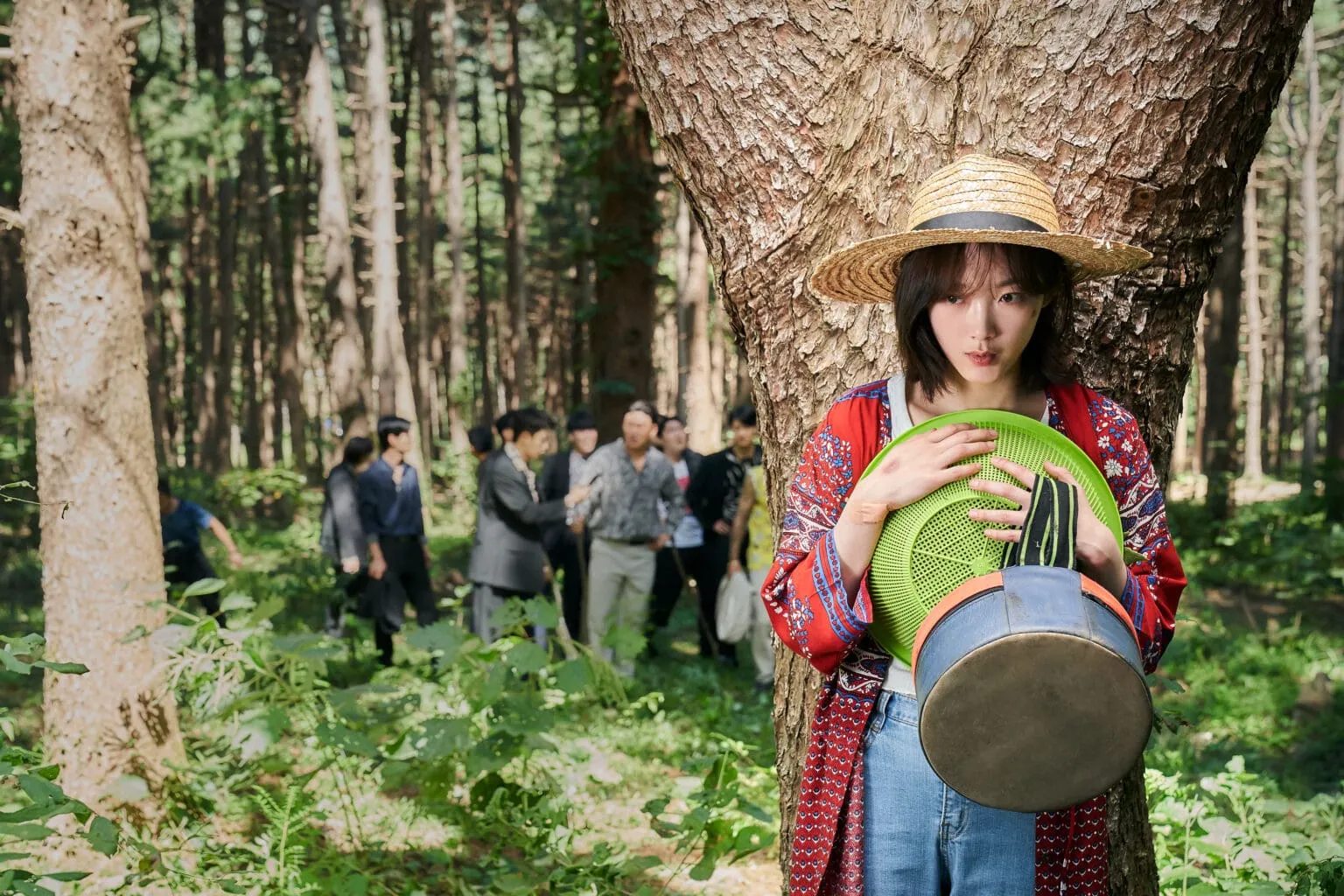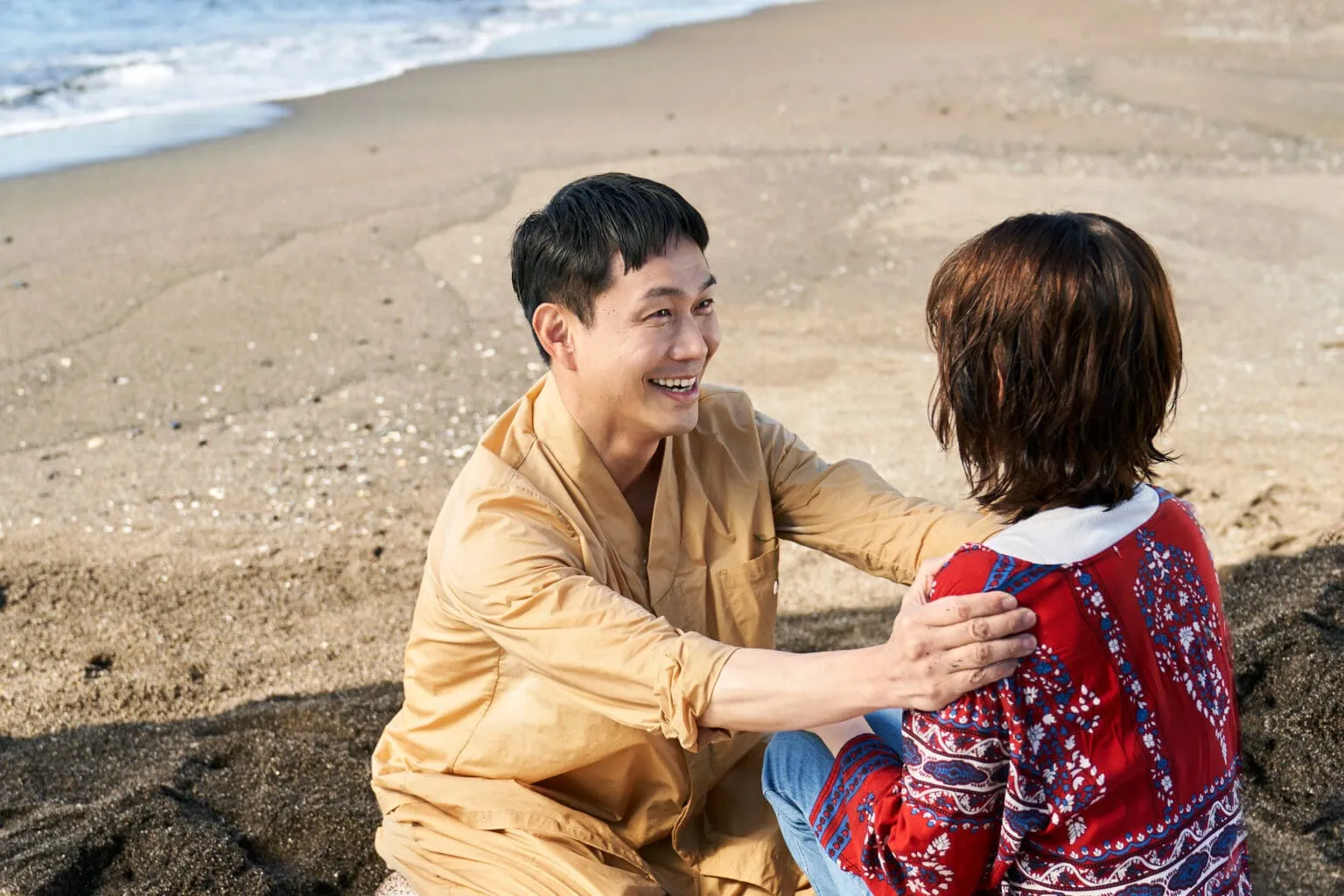In Mr. Plankton, we follow Hae-jo, a downtrodden orphan who becomes imprisoned in a cycle of petty crime and sorrow. When he learns he has a terminal illness, his journey begins in earnest, prompting a frantic quest to find his estranged father.
His reunion with Jae-mi, a fellow orphan who shares his desire for motherhood but faces her heartbreaking obstacles, most notably a recent diagnosis of infertility, complicates his search for familial connection. Their paths cross as Jae-mi prepares to wed Eo Heung, a well-meaning but sheltered heir, leading to a dramatic and unexpected wedding disruption.
Key events unfold with emotional weight: Hae-jo’s illness catalyzes his wild adventure, while tension rises when he crashes Jae-mi’s wedding, triggering a series of interactions that drive all characters to confront their vulnerabilities and wants. This narrative structure propels the plot ahead and challenges viewers to reflect on the fragility of human connections in the face of life’s unpredictability.
Character Analysis
At the core of Mr. Plankton is Hae-jo, an orphan whose life has been a series of bad circumstances leading him to a world of petty crime and survival on the outskirts of society. His character represents the struggles of those who feel invisible, reflecting a larger cultural tendency of detachment and longing for identity in contemporary narratives.
When Hae-jo learns of his terminal condition, his quest takes a dramatic turn, evolving into a very personal journey. This diagnosis not only catalyzes his activities but also causes intense introspection, revealing the layers of pain and trauma he has suppressed. His transformation from a cynical vagabond to someone grappling with the importance of connection reflects social fears about mortality and the desire for closure in a divided world.
Another captivating character whose desire for motherhood becomes a heartbreaking focal point of the narrative is Jae-mi, who is presented with a blend of vulnerability and strength. Her infertility diagnosis exacerbates her emotional turmoil, a heartbreaking event that propels her back into Hae-jo’s orbit.
Jae-mi and Hae-jo’s relationship is tense, reflecting a complicated tapestry of love, regret, and a desire for a family. Meanwhile, her imminent marriage to Eo Heung adds difficulty as she juggles her feelings for both men. This love triangle drives the plot and underscores the societal pressures women endure about motherhood and familial responsibilities, making Jae-mi a realistic figure in today’s cultural landscape.
Eo Heung serves as a counterpoint to both Hae-jo and Jae-mi, portraying a protected, wealthy life that contrasts strongly with their struggles. His character development centres on breaking free from his mother’s expectations, a journey that resonates with a generation seeking authenticity in a world full of fixed routes.
As Heung’s friendship with Jae-mi develops, we witness him grappling with his vulnerabilities, which are eloquently conveyed in moments of discomfort and sincerity. His development throughout the series highlights the complexities of love and societal duties, adding to the narrative with his distinct perspective.
The supporting cast, particularly Yoo Ki-ho, gives crucial complexity to the storyline. Ki-ho’s role as Hae-jo’s sidekick adds much-needed levity and comic relief, offsetting the series’ harsher themes. His figure represents the spirit of friendship and commitment, reminding us of the need for human connection in the face of upheaval.
Other secondary characters contribute to the narrative, each contributing to the fundamental themes of abandonment and the search for belonging. Their interactions with the leads help highlight the film’s overall message: that even at our darkest moments, connections can give us peace and hope.
Mr. Plankton’s characters are more than just plot devices; they reflect societal struggles, capturing the essence of what it means to be human in a world that frequently feels apathetic. Through deep character development and subtle relationships, the film creates a devastating commentary on love, loss, and the quest for meaning.
Themes and Messages
Mr. Plankton explores the concept of abandonment extensively, a moving thread running throughout the characters’ lives. Hae-jo’s orphanage story exemplifies a harsh reality: the emotional scars left by missing parents can have a tremendous impact on one’s identity.
This theme resonates strongly in today’s cultural landscape, as stories of familial disconnection and the search for belonging are becoming increasingly important. Each character’s past is based on loss, whether via physical separation or emotional neglect, giving a clear picture of how abandonment influences their decisions and relationships. The film reflects on larger societal issues, urging viewers to examine the consequences of a world where many people feel forgotten and undervalued.
The quest for identity is an important part of the narrative, especially as Hae-jo journeys to find his biological father. This search becomes a symbolic exploration of self-discovery, prompting him to confront his past and the trauma that comes with it. Jae-mi’s concurrent struggle with infertility affects her sense of self, as her fantasies of motherhood collide with the terrible realities she faces.
The film expertly illustrates the tension between societal expectations and personal wants, illustrating how characters navigate their pasts to construct a sense of identity in the face of upheaval. In many aspects, their storylines resemble the existential investigations seen in the works of directors such as Godard, who frequently investigated characters’ internal issues against the backdrop of social change.
Mr. Plankton is primarily an exploration of love and connection amid adversity. The relationships of Hae-jo, Jae-mi, and Eo Heung serve as focus points for investigating how people seek connection when their world feels uncertain. The film captures the complexities of love, showing how it can heal and harm, bind and isolate. The narrative underscores the fragility of these connections in moments of crisis, such as Jae-mi’s wedding day, demonstrating how love frequently rises from the ashes of sorrow.
This exploration is more than just a romantic endeavour; it reflects a broader cultural commentary on the need for human connection in an increasingly separated society. The film resonates with the emotional depth found in the works of current filmmakers such as Greta Gerwig, who also emphasizes the value of relationships in overcoming life’s problems.
Mr. Plankton’s interplay of these themes weaves a rich tapestry that resonates with viewers and invites thoughtful meditation on the complexities of human experience.
Directorial and Writing Style
Mr Plankton, directed by Hong Jong-chan, is a sophisticated exploration of emotional landscapes marked by a remarkable eye for detail and an understanding of the character’s inner struggles. Every shot feels alive with the characters’ struggles, and his visual storytelling is reminiscent of the French New Wave’s emphasis on realism and spontaneity.
The opening sequence, set against a harsh, snowy landscape, establishes the tone for Hae-jo’s sad journey, combining nature’s calm beauty with the turbulence of human emotion. Jong-chan’s ability to mix fun moments with dark themes of abandonment and loss creates a fascinating rhythm that captivates the audience. His expert use of close-up shots captures the rawness of the performers’ performances, allowing us to empathize with their vulnerabilities on a deeper level.
Jo Yong’s writing shows through in the character-driven narrative that propels Mr. Plankton. Her script is full of emotional depth, intertwining the lives of Hae-jo, Jae-mi, and Eo Heung in a tapestry of longing and connection. Each character’s discourse feels genuine, reflecting their struggles while addressing larger societal themes.
Yong’s ability to build relatable, flawed characters is reminiscent of Noah Baumbach’s work, which exposes the complexities of human relationships. The emotional stakes are evident, particularly as Jae-mi deals with her infertility, making her journey both tragic and empathetic.
Yong’s humour amid the drama creates a welcome contrast, ensuring that the narrative never feels unduly weighty and instead presents a candid look at life’s messiness. Jong-chan and Yong work together to create a film that is as much about the character’s internal conflicts as their external journeys, demonstrating a careful blend of directorial vision and narrative depth.
Tone and Genre
Mr. Plankton exists in a strange cross-section of dark comedy and typical romantic comedy, merging aspects that defy genre borders. At first glance, it appears to fit the well-known rom-com formula: a love story interlaced with difficulties, heartbreak, and a quest for connection.
The film, however, displays a darker undercurrent as the narrative progresses that underscores the characters’ struggles with abandonment and identity. This genre-bending approach encourages viewers to reevaluate their assumptions since humorous moments frequently contrast with more serious themes. It’s reminiscent of films like Frances Ha, in which humour develops from the absurdity of life’s struggles, creating a distinct environment that feels familiar and pleasantly unique.
Mr Plankton’s tone swings are expertly accomplished, allowing humour and drama to coexist in a natural rather than forced way. Moments of fun, frequently offered by Hae-jo’s humorous asides or Yoo Ki-ho’s comedic presence, break up the deeper, more emotional sequences. This interplay not only keeps the audience interested but also enhances the impact of the dramatic arcs.
When Jae-mi confronts her infertility, for example, the absurdity of the circumstance lightens the mood, illustrating how humour can emerge from pain. This balance is reminiscent of the works of current filmmakers such as Greta Gerwig, who use humour to explore complicated emotional landscapes. This makes the film more than just a story about romantic entanglements but also a profound commentary on life’s unpredictability.
Cinematography and Production Design
In Mr. Plankton, the cinematography enhances the plot by creating an immersive experience that reflects the characters’ emotional landscapes. The camera technique, done with great compassion, depicts both intimate moments of vulnerability and the larger, often chaotic world in which these characters live.
Natural light in numerous scenes creates a sense of reality, anchoring the narrative in a tangible location that resonates with the audience. This method not only emphasizes the film’s themes of abandonment and longing but also reflects the rawness of human experience—a technique reminiscent of French New Wave cinema, where authenticity is paramount.
Several major visuals stand out, especially the opening sequence on the snowy slope, which contrasts tranquil beauty with the harsh reality of Hae-jo’s situation. This powerful shot establishes the emotional tone of the film. At the same time, later scenes of Hae-jo and Jae-mi navigating urban settings visually emphasize their feelings of isolation in a fast-paced world.
Another remarkable scene happens after Jae-mi’s emotional collapse, when close-ups reveal the depth of her misery, making the audience vividly aware of her internal conflict. These images elicit intense emotions and serve as compelling reminders of the characters’ travels, emphasizing the film’s exploration of love, identity, and the search for connection in an indifferent world.
Audience Reception
Mr. Plankton elicits a strong emotional response, allowing viewers to empathize with its characters and their struggles. The film’s exploration of themes such as abandonment and the quest for identity resonates with a wide audience, particularly those who experience similar feelings of isolation and longing.
Hae-jo’s journey, marked by his terminal sickness and search for familial connection, catalyzes viewers to reflect on their relationships and vulnerabilities. Jae-mi’s agonizing desire for motherhood provides an extra relatability, eliciting empathy and understanding. The subtle performances, particularly from the leads, transport the audience into their emotional worlds, making it difficult not to be invested in their futures.
The series successfully conveys its thoughts through humour and tragedy, resulting in an intimate and global narrative. Its ability to blend fun moments with meaningful observations on life’s hardships makes it relevant to today’s societal issues.
As a cultural relic, Mr. Plankton entertains and sparks significant discussions about love, loss, and the human experience, cementing its place in modern cinema’s continuous dialogue. The film concludes with a poignant reminder of the importance of connections, making it a memorable viewing experience long after the credits roll.
The Review
Mr. Plankton
Mr. Plankton is a deep exploration of love, loss, and the search for identity that expertly blends dark comedy with emotional drama. While it explores significant themes of abandonment and connection, its inconsistent pacing and tonal swings may disappoint some viewers. The performances, especially those of the leads, elevate the narrative, making the emotional stakes resound. Overall, the series provides a deep meditation on the complexities of human relationships, making it an interesting view for those looking for meaning amid life's unpredictability.
PROS
- Strong emotional core that resonates with audiences.
- Well-developed characters with relatable struggles.
- Effective blend of humor and drama.
CONS
- Uneven pacing and tonal shifts can disrupt engagement.
- Some side plots feel underdeveloped or irrelevant.
- Occasional predictability in the narrative.





















































